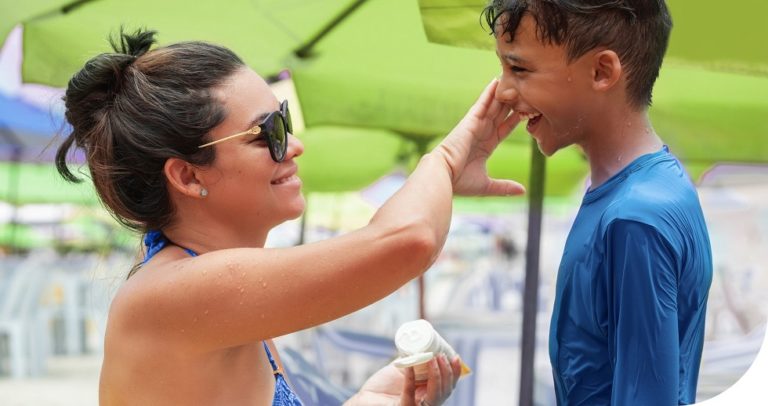Stay Safe in the Sun This Summer
May 26, 2022

The sun is shining brightly, the temperatures are rising — and so is the potential for sunburns and other serious skin damage.
Summertime might be a time of relaxation, but when it comes to sun protection, you can’t let your guard down.
CareSpot and MedPost clinics are here whenever you need help managing skin conditions, but there are several things you can do to reduce your risk.
Beware of burns
The biggest summer skin danger is pretty obvious: sunburns. With better weather comes more outside activity — and, if your not careful, painful or itchy burns might follow.
Here are a few ways you can protect yourself:
Watch the clock
Timing is everything, and that’s true for your skin, too!
The sun’s rays are usually strongest between 10 a.m. and 4 p.m., so it’s particularly important that you limit how long you’re exposed during that timeframe.
But even if you aren’t basking in warm rays, your skin might still be in danger. That’s right: You can still get sunburned on a cloudy day as UV rays can easily penetrate clouds and continue to damage your skin.
Use strong (unexpired!) sunscreen and lip balm
What kinds of sunscreen should you use? One important number can help you figure it out: SPF.
SPF stands for Sun Protection Factor. The higher the SPF number listed on your sunscreen, the more protection you’re getting. To prevent burns and sun damage, look for sunscreens with at an SPF of at least 30.
In addition to sunscreen, you might consider protective lip balm, which should also have an SPF of at least 30.
One other key reminder about sunscreen: Make sure it’s not expired! The expiration date should be listed on the container and if that date has passed, throw the sunscreen out and buy a new one.
Coverage is key
Once you’ve got the right sunscreen, applying it is key. Make sure t to apply sunscreen to all exposed skin, including your hands. It sounds surprising, but your hands actually get more sun exposure than any part of your body, mostly while you’re driving.
If you’re planning to be out in the sun for long periods (like a day at the beach), set a reminder on your phone to reapply sunscreen every two hours!
Keep an eye on the kids
Summer is especially fun for kids, but they need a little extra attention to help them stay safe now — and in the future.
Experts estimate that people get 80% of their total lifetime sun exposure during childhood. That can put kids at risk for deadly skin cancer later in life.
Adults should ensure that children wear the right kind of sunscreen and that they’re re-applying regularly, even if it means putting the fun on hold for a few minutes.
Babies and young children need extra attention when it comes to sun protection. Babies younger than six months shouldn’t be in the sun at all.
If they do have to be outside, sunglasses, clothing and wide-brimmed hats are key to preventing harmful burns. You should also check with a CareSpot or MedPost provider before using sunscreen on an infant.
Special tips for summer
You should remember to take care of your skin all year long, but it’s especially important during the summer. Here are some key things to remember in the warmer months:
Protect your eyes
Your eyes and the sensitive skin around them experience increased UV exposure during the summer months.
Make sure to wear sunglasses with at least 99% UVA and UVB protection. These types of glasses can help protect you from skin damage near your eyes as well as eye conditions like cataracts.
Covered with cosmetics alone? Think again
Any kind of face coating can block UV rays but makeup and other cosmetics do not offer real protection against sunburn and skin cancer because makeup doesn’t bind to the skin as well as sunscreen does.
And any benefits you do get from them can disappear at you sweat or wipe them off throughout the day.
So what should you do? Apply your sunscreen first then add makeup over it. You can also look for makeup that has an SPF rating or use a tinted sunscreen to act as a foundation.
Refrain from the “-Caine”
What should you do if you get a sunburn? First off, avoid any treatments that have the phrase “-caine” in the name or ingredients (such as Solarcaine). Those types of products can further irritate your damaged skin.
Instead, reach for pure aloe vera gel, take cool baths or use cold compresses to ease the pain of a sunburn. Over-the-counter pain relievers can also help.
Once you’ve been sunburned, stay out of the sun until it’s healed. If you develop symptoms like blisters, nausea, vomiting or fever, head to a CareSpot or MedPost clinic near you for treatment as soon as you can.
What about Vitamin C?
You’ve probably heard about the many benefits of Vitamin C. Good news: Those include healthier skin.
Vitamin C can help your skin year round, and that’s particularly true in the summer. It is generally safe on all types of skin and can help product you from the sun’s damaging rays.
You can also look for moisturizers that contain aloe or soy, as both help rehydrate skin and reduce itching.
If you need help, we’re here for you
All of these tips can help keep you and your family safe this summer so that you can focus on fun — not skincare issues.
But if you do need help CareSpot and MedPost are ready to help with sunburns, insect bites or stings, rashes, hives, poison ivy and more.
For many skin issues, you can go to urgent care instead of the ER. Many of our clinics are open seven days a week with extended hours. Walk right in or schedule your visit today!
